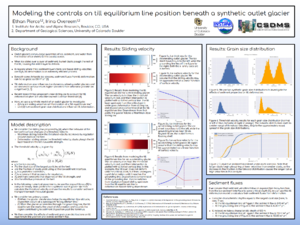2021 CSDMS meeting-067: Difference between revisions
From CSDMS
Ethanpierce (talk | contribs) Created page with "{{CSDMS meeting personal information template-2021 |CSDMS meeting first name=Ethan |CSDMS meeting last name=Pierce |CSDMS meeting institute=University of Colorado Boulder |CSD..." |
No edit summary |
||
| (4 intermediate revisions by 2 users not shown) | |||
| Line 21: | Line 21: | ||
}} | }} | ||
{{CSDMS meeting abstract title temp2021 | {{CSDMS meeting abstract title temp2021 | ||
|CSDMS meeting abstract title= | |CSDMS meeting abstract title=Modeling the controls on till equilibrium line position beneath a synthetic outlet glacier | ||
|Working_group_member_WG_FRG= | |Working_group_member_WG_FRG=Terrestrial Working Group | ||
}} | }} | ||
{{CSDMS meeting authors template | {{CSDMS meeting authors template | ||
| Line 34: | Line 34: | ||
}} | }} | ||
{{CSDMS meeting abstract template 2021 | {{CSDMS meeting abstract template 2021 | ||
|CSDMS meeting abstract= | |CSDMS meeting abstract=Outlet glaciers convey large quantities of ice, sediment, and water from the interior of ice sheets to the coastal ocean. Beneath ice sheets, sediment is transported by melt water, entrainment in basal ice layers, and deformation of the till layer. Till deformation occurs when the ice sliding velocity exceeds a certain threshold, causing buried clasts to plough the sediment layer (Zoet and Iverson, 2020). Because ice velocity tends to decrease below the ice equilibrium line, but the threshold velocity to induce ploughing stays constant, the glacier will deposit till around the “till equilibrium line,” where the ice sliding velocity drops below the threshold velocity (Alley et al., 1989). Investigating the controls on till equilibrium lines will improve our understanding of erosion and sediment transport beneath glaciers and ice sheets. Here, we implement a numerical model of steady-state till equilibrium line position under a synthetic outlet glacier. We explore the influence of ice sliding velocity, clast sizes and distribution, and effective pressure at the bed. Additionally, we consider the case where the threshold velocity to induce ploughing is not constant, but instead depends on ice and sediment properties. | ||
Zoet, L. K., & Iverson, N. R. (2020). A slip law for glaciers on deformable beds. Science, 368(6486), 76-78. | |||
Alley, R. B., Blankenship, D. D., Rooney, S. T., & Bentley, C. R. (1989). Sedimentation beneath ice shelves—the view from ice stream B. Marine Geology, 85(2-4), 101-120. | |||
|CSDMS meeting posterPDF= CSDMS_Poster_2021_Pierce.pdf | |||
|CSDMS meeting posterPNG= CSDMS_Poster_2021_Pierce.png | |||
}} | }} | ||
{{blank line template}} | {{blank line template}} | ||
Latest revision as of 12:37, 17 May 2021
Log in (or create account for non-CSDMS members)
Forgot username? Search or email:CSDMSweb@colorado.edu
Browse abstracts
Modeling the controls on till equilibrium line position beneath a synthetic outlet glacier
Ethan Pierce, University of Colorado Boulder Boulder Colorado, United States. ethan.pierce@colorado.edu
Irina Overeem, University of Colorado Boulder Boulder Colorado, United States. irina.overeem@colorado.edu
Outlet glaciers convey large quantities of ice, sediment, and water from the interior of ice sheets to the coastal ocean. Beneath ice sheets, sediment is transported by melt water, entrainment in basal ice layers, and deformation of the till layer. Till deformation occurs when the ice sliding velocity exceeds a certain threshold, causing buried clasts to plough the sediment layer (Zoet and Iverson, 2020). Because ice velocity tends to decrease below the ice equilibrium line, but the threshold velocity to induce ploughing stays constant, the glacier will deposit till around the “till equilibrium line,” where the ice sliding velocity drops below the threshold velocity (Alley et al., 1989). Investigating the controls on till equilibrium lines will improve our understanding of erosion and sediment transport beneath glaciers and ice sheets. Here, we implement a numerical model of steady-state till equilibrium line position under a synthetic outlet glacier. We explore the influence of ice sliding velocity, clast sizes and distribution, and effective pressure at the bed. Additionally, we consider the case where the threshold velocity to induce ploughing is not constant, but instead depends on ice and sediment properties.
Zoet, L. K., & Iverson, N. R. (2020). A slip law for glaciers on deformable beds. Science, 368(6486), 76-78.

